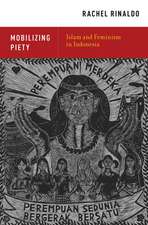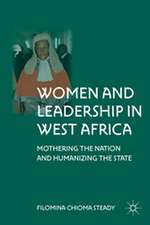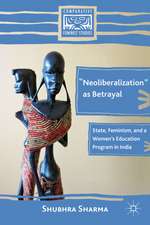Party Politics, Religion, and Women's Leadership: Lebanon in Comparative Perspective
Autor Kenneth A. Loparoen Limba Engleză Hardback – 5 dec 2013
| Toate formatele și edițiile | Preț | Express |
|---|---|---|
| Paperback (1) | 385.08 lei 6-8 săpt. | |
| Palgrave Macmillan US – 5 dec 2013 | 385.08 lei 6-8 săpt. | |
| Hardback (1) | 391.61 lei 6-8 săpt. | |
| Palgrave Macmillan US – 5 dec 2013 | 391.61 lei 6-8 săpt. |
Preț: 391.61 lei
Nou
Puncte Express: 587
Preț estimativ în valută:
74.93€ • 78.45$ • 62.00£
74.93€ • 78.45$ • 62.00£
Carte tipărită la comandă
Livrare economică 05-19 aprilie
Preluare comenzi: 021 569.72.76
Specificații
ISBN-13: 9781137333209
ISBN-10: 1137333200
Pagini: 283
Ilustrații: XII, 283 p.
Dimensiuni: 140 x 216 x 20 mm
Greutate: 0.5 kg
Ediția:2013
Editura: Palgrave Macmillan US
Colecția Palgrave Macmillan
Locul publicării:New York, United States
ISBN-10: 1137333200
Pagini: 283
Ilustrații: XII, 283 p.
Dimensiuni: 140 x 216 x 20 mm
Greutate: 0.5 kg
Ediția:2013
Editura: Palgrave Macmillan US
Colecția Palgrave Macmillan
Locul publicării:New York, United States
Cuprins
Introduction 1. Toward a Theory of Party Religiosity and Women's Leadership 2. A Traveling Theory of Party Religiosity and Women's Leadership 3. Why Lebanon? The Puzzle and Pool of Women in Party Politics 4. Party Religiosity, Political Culture, and the Civil War 5. Unpacking Party Institutionalization 6. Finding that Special Niche: Women for Parties 7. Party Politics Explaining Women's Leadership 8. Can Women Break Through the Political Glass Ceiling? Concluding Remarks Epilogue
Recenzii
'Fatima Sbaity Kassem produces an incisive analysis. Cutting through prevailing explanations, she pinpoints political party religiosity as the driver of low female parliamentary representation in 330 parties and 26 countries. No previous work on women's political participation has targeted a precise variable so persuasively. Exceedingly readable and powerful, this book is an eye-opener for feminists, political activists, and social theorists.' - Suad Joseph, Distinguished Professor of Anthropology and Women and Gender Studies, University of California, Davis, USA
'This unique book with its bold argument about the impact of political party religiosity on patterns of women's leadership is sure to be debated and discussed. Backed by prodigious and original research broadly comparative and statistical in its cross-national vision, on the one hand, and astoundingly detailed in its close analysis of the case study of Lebanon, on the other Fatima Sbaity Kassem's findings are as illuminating as her thesis is provocative.' - Lila Abu-Lughod, Joseph L. Buttenwieser Professor of Social Science, Columbia University, USA
'Why have women's gains in socioeconomic and demographic realms not translated into greater women's leadership in politics, despite women's increased mobilization within political parties? Espousing a compelling institutional perspective, Fatima Sbaity Kassem shows that parties dominated by religious agendas block women's advancement to leadership positions. Based on extensive fieldwork involving in-depth interviews in Lebanon and a comparative cross-national analysis, her book makes a valuable contribution to the studies of women's political participation in general.' - Gunes Murat Tezcur, Loyola University Chicago, USA
'This unique book with its bold argument about the impact of political party religiosity on patterns of women's leadership is sure to be debated and discussed. Backed by prodigious and original research broadly comparative and statistical in its cross-national vision, on the one hand, and astoundingly detailed in its close analysis of the case study of Lebanon, on the other Fatima Sbaity Kassem's findings are as illuminating as her thesis is provocative.' - Lila Abu-Lughod, Joseph L. Buttenwieser Professor of Social Science, Columbia University, USA
'Why have women's gains in socioeconomic and demographic realms not translated into greater women's leadership in politics, despite women's increased mobilization within political parties? Espousing a compelling institutional perspective, Fatima Sbaity Kassem shows that parties dominated by religious agendas block women's advancement to leadership positions. Based on extensive fieldwork involving in-depth interviews in Lebanon and a comparative cross-national analysis, her book makes a valuable contribution to the studies of women's political participation in general.' - Gunes Murat Tezcur, Loyola University Chicago, USA
Notă biografică
Fatima Sbaity Kassem is the former Director of the UN-Centre for Women, Economic and Social Commission for Western Asia (UN-ESCWA) in Baghdad, Amman, and Beirut and a freelance consultant on gender and women's issues in Arab countries. She received her PhD from Columbia University, USA and was Regional Coordinator for the Fourth World Conference on Women (Beijing, 1995).
















